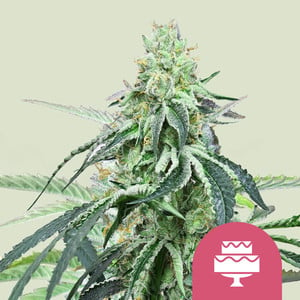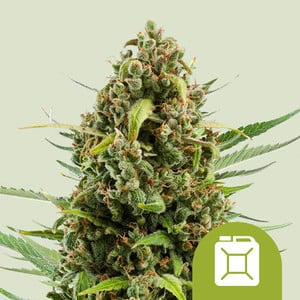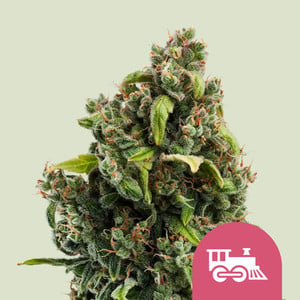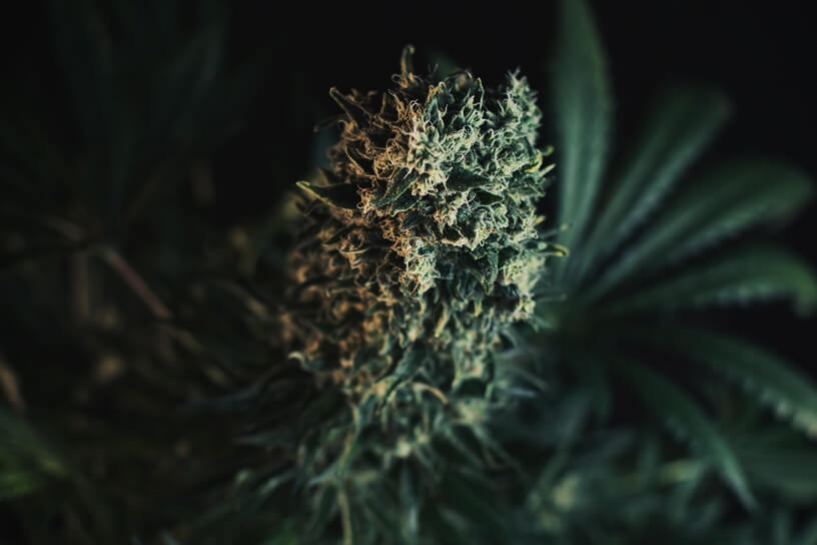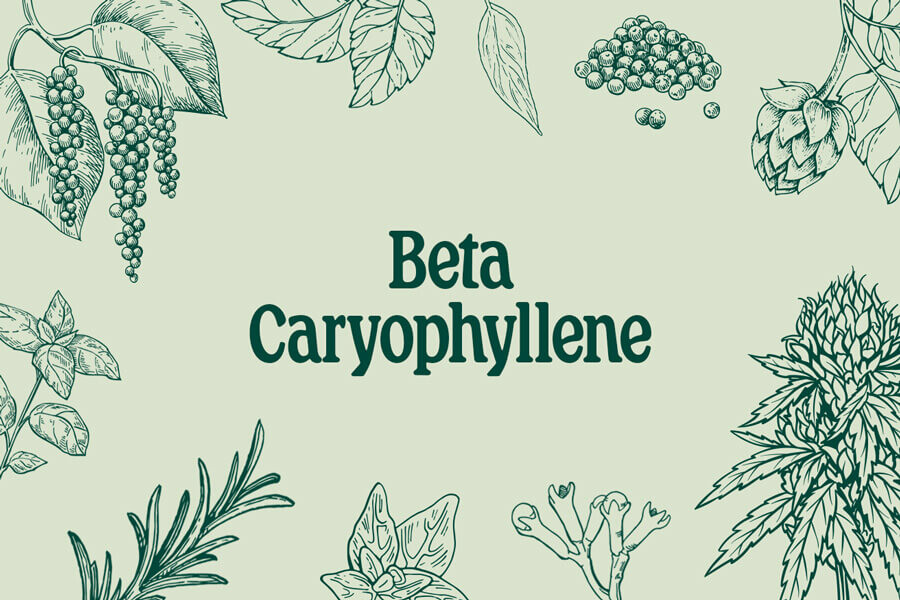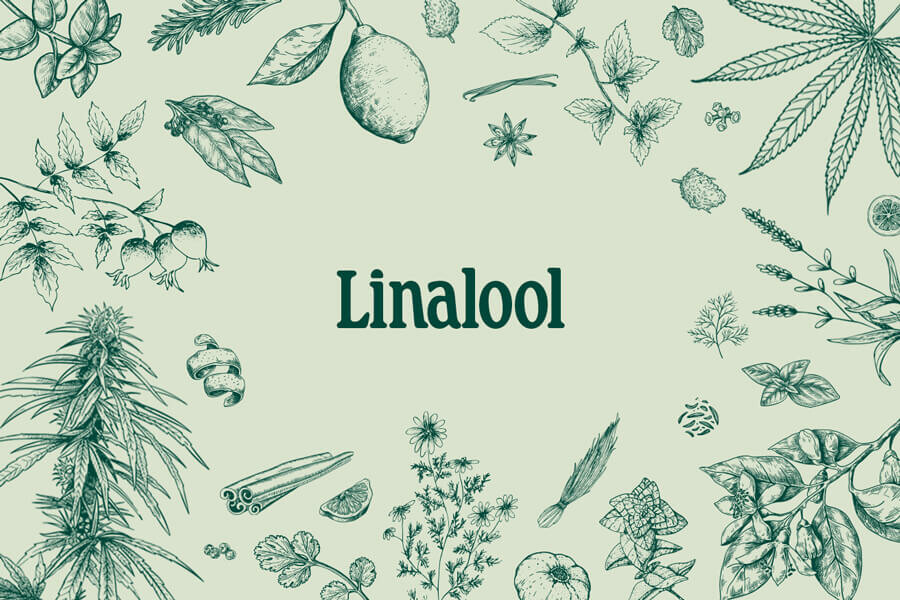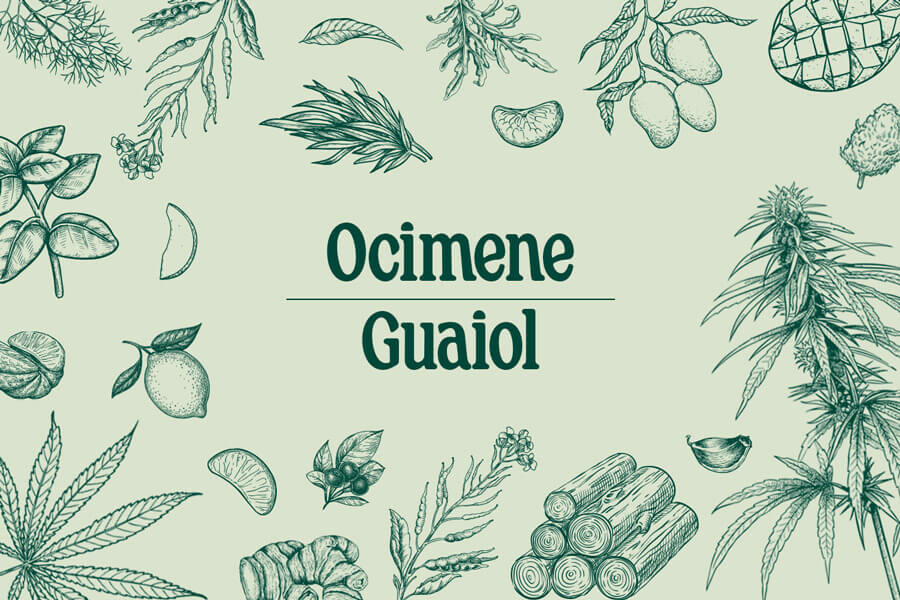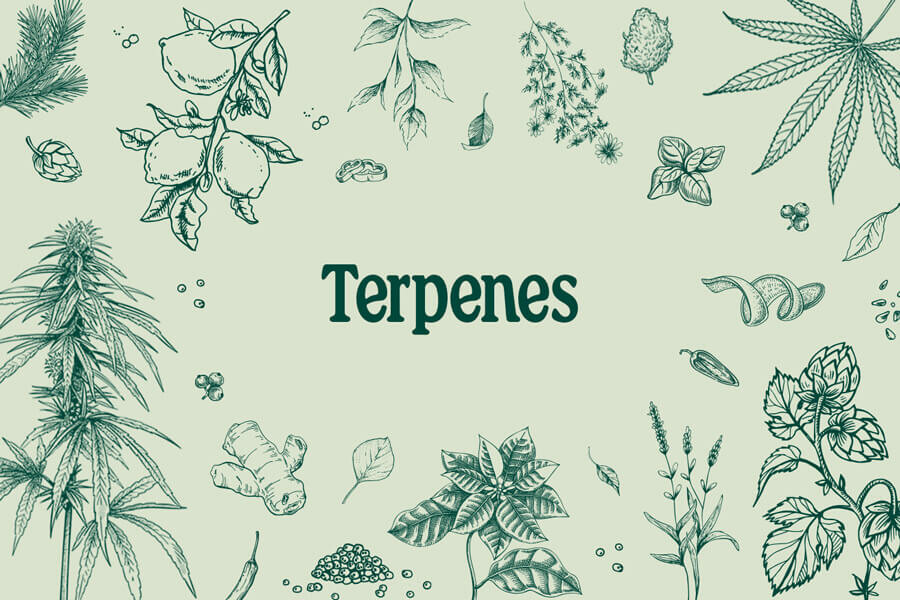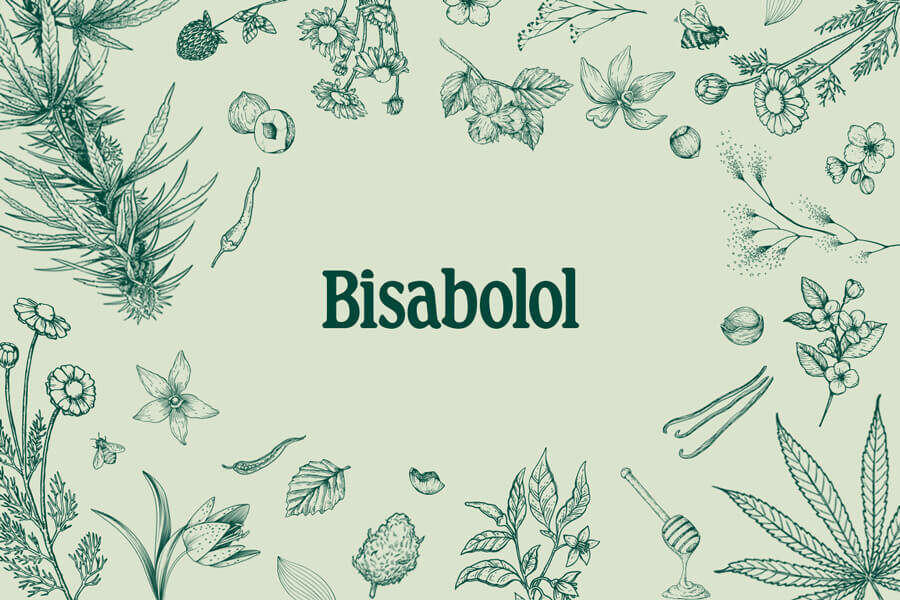
Bisabolol: Discover This Lesser-Known Cannabis Terpene
Bisabolol doesn't occur in high concentrations in cannabis compared to the likes of caryophyllene, pinene, and limonene. Regardless, this minor terpene infuses many strains with notes of earth, flowers, and vanilla. But there's more to this mighty molecule than nice flavours. Researchers continue to test its vast therapeutic potential.
Contents:
The bisabolol terpene derives from the essential oils of plants typically used in traditional holistic systems, including chamomile and cannabis. Aside from the interest it's garnering from the scientific community, bisabolol also holds pride of place in the eyes (and taste buds) of cannabis users, as it contributes delightful flavours and aromas to certain strains. Continue reading to learn everything you need to know about bisabolol, from its flavour and aroma to its fascinating effects.

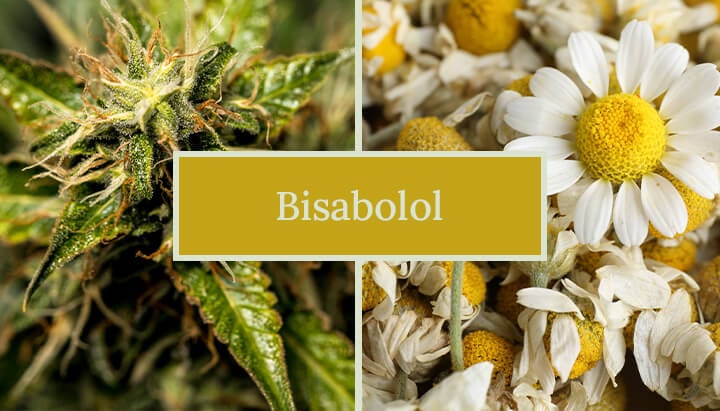
Chemistry of the Bisabolol Terpene
Terpenes are truly remarkable natural compounds that do much more than make cannabis smell and taste good. These chemicals play critical roles in ecosystems, from helping trees and fungi communicate amongst themselves to protecting plants against UV rays, pests, and pathogens. These are the functions of terpenes, but what about their form?
You can look at terpenes as chemical Lego sets. All of these compounds are made up of individual building blocks (or Lego bricks) called isoprene units—small molecules containing five carbon atoms. By forming head-to-tail connections with each other, isoprene units assemble into bigger structures, otherwise known as terpenes.
Monoterpenes, such as pinene and limonene, are the smallest of this chemical class, possessing just two isoprene units and a total of 10 carbon atoms. As a bigger molecule, bisabolol falls into the category of sesquiterpenes. These compounds are made up of three isoprene units and possess a total of 15 carbon atoms.
Bisabolol has a chemical formula of C₁₅H₂₆O. However, the terpene has several different isomers—molecules that feature the same atoms but in different arrangements. As the most common and well-studied of these chemicals, α-bisabolol exists as two different enantiomers: (+)-α-bisabolol and (-)-α-bisabolol (also known as levomenol). Other isomers include β-bisabolol and bisabolol isomer A.
Aside from its presence in certain cannabis strains, bisabolol also occurs elsewhere in nature, including in chamomile, sage, patchouli, and some varieties of lavender.
Aroma and Flavour of Bisabolol
As a minor or secondary terpene in cannabis, bisabolol shows up in far lower concentrations than major terpenes such as limonene and myrcene. That said, α-bisabolol still contributes noticeable flavours and aromas to select cannabis cultivars. The aromas of bisabolol can be divided into three categories. Sweet and floral notes, reminiscent of chamomile flowers, dominate the profile, while secondary undertones of honey and vanilla contribute further sweetness. Finally, notes of fruit, nuts, and pepper complete the profile. The flavours of the terpene largely match its smell, with sweet, floral, herbal, and earthy tones dominating the mix.
Effects Associated With Bisabolol in Cannabis
Aside from contributing pleasant flavours and aromas to specific cannabis strains, bisabolol may also directly influence their effects. While cannabinoids such as THC and CBD are most responsible for the effects of certain cannabis varieties, terpenes are capable of synergising with cannabinoids and steering the effects in certain directions.
Overall, bisabolol exerts a soothing, relaxing, and physical effect. Research hasn’t yet uncovered whether bisabolol directly binds to receptors of the endocannabinoid system in the same way as THC; however, both bisabolol and THC activate T-type calcium channels[1], which are the targets of drugs aimed to combat pain and other neurological ailments, hinting at a possible molecular synergy.
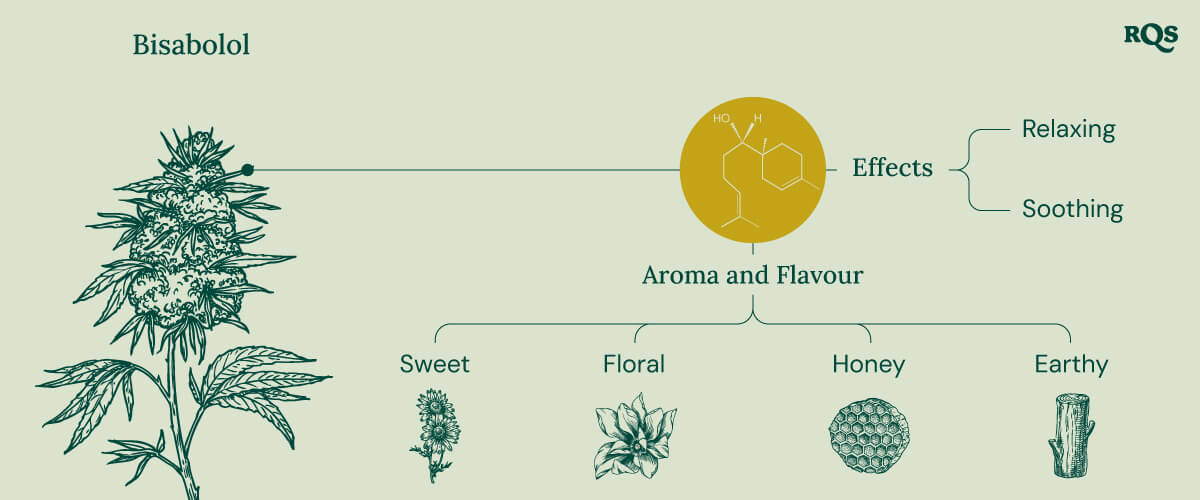
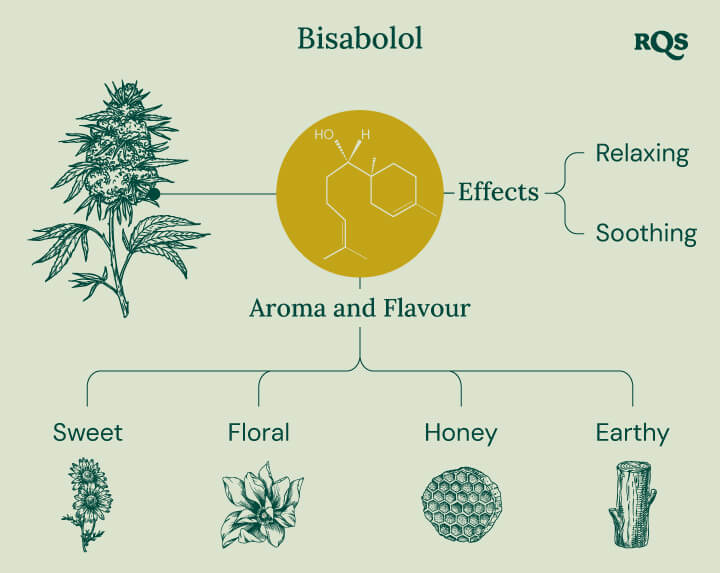
Bisabolol Terpene: A Look at the Research
Researchers are currently testing a range of cannabis terpenes for their therapeutic potential, including bisabolol. Currently, research on this sweet and floral terpene remains in the early stages. While each study offers important insight into its potential effects, it’s important to note that cell and animal studies don’t always accurately represent how compounds work in the human body. With this in mind, let’s take a look at what the research has to say about bisabolol's clinical potential.
- Inflammation
- A normal physiological response to infection and injury, acute inflammation plays a critical role in keeping us in good health. However, chronic inflammation caused by environmental factors such as diet and pollutants underscores many different diseases. For this reason, researchers are keen to find natural compounds that can help to quell this condition.
A 2024 study[2] tested bisabolol-rich chamomile essential oil on a model of lower urinary tract inflammation in an effort to see whether it could help to remedy the condition. Similarly, a 2022 study[3] tested both the essential oil and β-bisabol derived from cotton gin trash (CGT), a waste product of the cotton industry, on a cellular model of inflammation, seeking to compare its effects to known topical anti-inflammatory agents.
Finally, another 2022 study[4] pitted α-bisabolol against both cell and animal models of colon inflammation. After administering the terpene, the research team analysed its effects on PPAR-γ, a receptor protein that down-regulates the expression of genes that code for pro-inflammatory cytokines and other inflammatory molecules. - Liver Protection
- Bisabolol’s potential may span into the domain of liver protection. In processing and filtering the blood, the liver plays a crucial role in human physiology. However, a range of factors can damage it over time, including alcohol abuse, viral infections, and diet. A 2022 study[5] applied α-bisabolol in a model of liver injury in ducks and looked for signs of protective effects.
- Heart Protection
- Responsible for keeping nourishing blood pumping throughout the body, things can quickly go awry when heart function takes a hit. A 2018 study[6] looked at the potential role of α-bisabolol in heart attack protection. The team administered the terpene to a rat model of heart attack and looked for any signs of altered mitochondrial function and cellular protection.
- Skin Ageing & Dermatitis
- Our skin plays a crucial role in both our physical and psychological health. Physically, it provides a protective barrier against the outside world. Psychologically, it makes us feel good when our skin looks vibrant and fresh. Various factors can impact both the function and ageing of our skin. So, where does the bisabolol terpene fit into the picture?
In terms of skin ageing, a 2024 study[7] tested α-bisabolol in both cell and animal models of skin ageing. They carried out the study with the goal of looking for changes in the senescence of human skin fibroblast cells and improvements in skin ageing. They also set out to monitor any changes in elastic and collagen production.
Researchers are also keen to uncover the potential impact of bisabolol on skin functions. A 2024 study[8] looked at the effects of a hydrogel containing bisabolol-loaded nanoparticles on levels of myeloperoxidase—an enzyme involved in the progression of atopic dermatitis. Additionally, a 2023 study[9] looked at the effects of a novel plant-based substance containing Melaleuca alternifolia oil, eucalyptol, and α-bisabolol on a model of seborrheic dermatitis (SD). - Cancer
- With the number of annual cancer cases projected to rise to almost 30 million[10] by the year 2040, researchers are scrambling to find new therapeutics to help in the battle against this deadly disease. Some scientists have turned their attention to the bisabolol terpene as a potential future drug. A 2024 study[11] sought to discover the potential synergistic action of α-bisabolol and the diterpene phytol, with specific emphasis on autophagy (cellular repair) and apoptosis (controlled cell death) in a human lung cancer cell line.
Likewise, a 2023 study[12] found that cyclodextrin sugar molecules improved the solubility of α-bisabolol, allowing for intravenous administration. The researchers then applied this formula to human pancreatic cancer cell lines and looked for suppression of focal adhesion kinase (FAK) phosphorylation—a mechanism that is often over-expressed in different types of cancer. - Oxidative Stress
- The human body naturally produces substances called free radicals as a byproduct of energy creation. Under normal conditions, antioxidant systems in the body manage to quell them, preventing oxidative stress and subsequent DNA damage. However, an excess of free radicals caused by lifestyle and environmental factors can cause a range of symptoms and diseases, from fatigue and memory problems to cancer and neurodegenerative disorders. As an antioxidant, researchers are keen to test the effectiveness of bisabolol in managing oxidative stress.
A 2023 study[13] tested a type of α-bisabolol on a zebrafish model of memory deficits. The researchers sought to document any changes in memory function caused by a possible dampening of oxidative stress.
Another 2023 study[14] tested bisabolol in a seizure model in rats, looking for any signs of neuroprotection. The team measured the levels of pro-inflammatory cytokines in the animals and monitored neuroinflammation. - Neuropathic Pain
- As a complex condition caused by a range of factors, including stroke, chemotherapy, surgery, and spinal cord injury, neuropathic pain affects around 7–10% of the general population. A 2019 study[15] pitted bisabolol against an animal model of trigeminal neuropathic pain and looked for changes in central sensitisation—the hypersensitivity of the central nervous system that results in amplified pain responses.
- Antifungal & Antiparasitic
- Various infectious species of fungi and parasites pose a serious health risk to human beings. Despite existing treatment options, scientists are looking to the natural world in an effort to find new therapeutics. As one of the most common fungal infections, Candida albicans causes a range of symptoms and conditions, including oral thrush and invasive candidiasis, which can affect the internal organs. Research[16] conducted in 2024 tested a range of essential oil components, including α-bisabolol, against Candida albicans. They looked for inhibition of ACT1, the gene that codes for the structural protein actin.
Regarding parasites, researchers from the Federal University of Ceará and São Paulo University, both based in Brazil, tested bisabolol[17] against Trypanosoma cruzi, a parasite that causes Chagas disease in humans. This parasite has a complex life cycle with three key stages: one that infects the blood, one that resides in host cells, and one that develops in the gut. The researchers monitored the effects of bisabolol against all three forms, with the goal of documenting any signs of apoptosis and mitochondrial depolarisation. - Anxiety
- Around 4%[18] of the global population currently experience anxiety disorders of varying degrees. While some forms of anxiety manifest as small bouts of nervousness, others are crippling and lead to a substantial reduction in the quality of a person’s life. With this in mind, researchers are looking at terpenes, including bisabolol, in the content of anxiety disorders. A 2017 study[19] administered bisabolol to mice before conducting a series of behavioural tests. Their research methodology revolved around testing for any anti-anxiety action, particularly involving GABAergic transmission, a pathway that involves the major inhibitory neurotransmitter in the brain.
Bisabolol: Evidence Continues to Mount for This Cannabis Terpene
Bisabolol plays an important role in the cannabis experience. In certain strains, it contributes to a soothing and relaxing high. On top of this, it also imparts complex yet complementary flavours of earthiness, flowers, herbs, honey, and vanilla. Aside from this, studies continue to test the terpene against various cell and animal models of disease in hopes of uncovering its therapeutic potential.
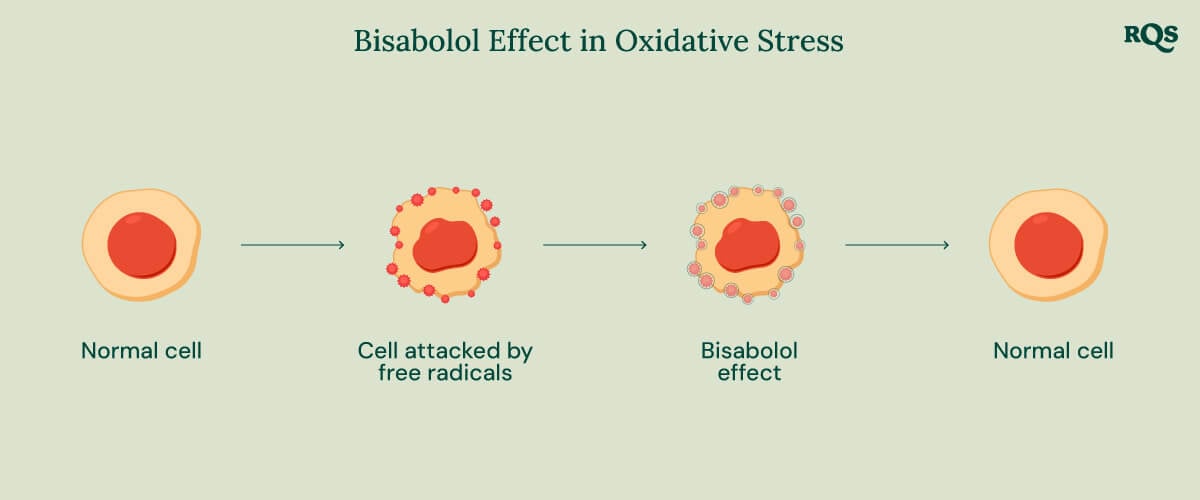
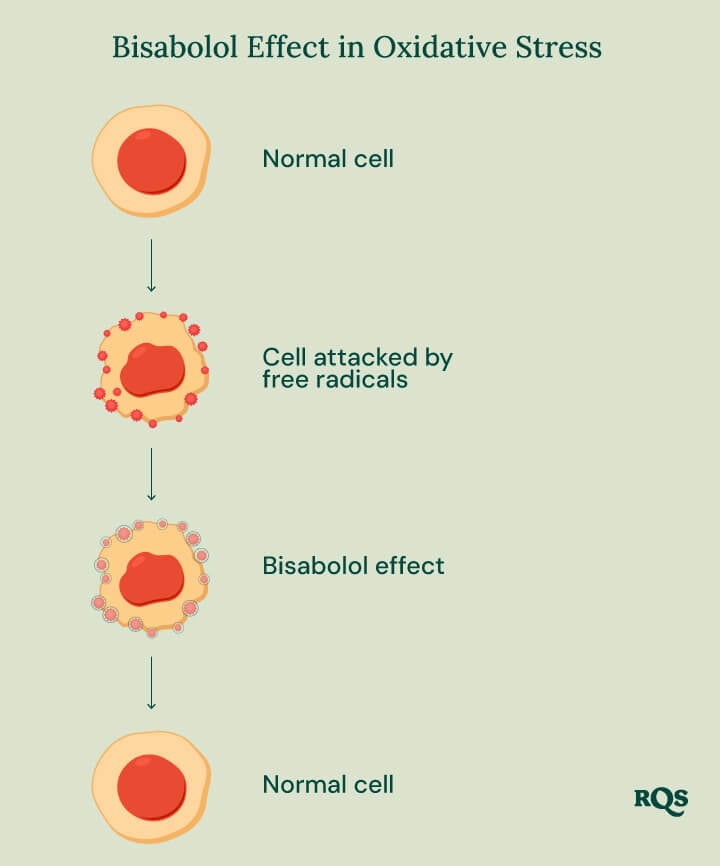
Strains High in Bisabolol
After reading all of that, we’d hazard a guess you’ve developed a newfound interest in the bisabolol terpene! If you want to experience what this phytochemical has to offer in the context of cannabis, try your hand at growing some of the strains below that offer relatively large quantities of this minor cannabinoid.
-
Wedding Gelato
As our version of the legendary Ice Cream Cake, our skilled breeders created Wedding Gelato by crossing parent strains Wedding Cake, Gelato, and Gelato 33. This potent mix created a slightly indica-dominant hybrid that produces a staggering THC content of 25% alongside high levels of the bisabolol terpene. Start your grow by soaking your seeds in a glass of water for 12–24 hours. Then, sow them into cell trays filled with a high-quality potting mix. Add a pinch of mycorrhizal fungi to assist root development and boost resilience against fungal infections. At the end of week one, you’ll have 3 cm tall seedlings ready to transplant. Move them into 10–15 l pots amended with organic matter and additional nutrients. Expect your plants to grow to 10–15 cm by the end of week two and 20–25 cm by the end of week three. Apply LST and topping at this stage if you want to keep your plants stealthy and compact. Move any plants outdoors at this point if you plan on finishing them under the open sky. Depending on pot size and training techniques used, you can expect your plants to reach anywhere between 40–150 cm by the end of veg.
Defoliate your canopies as your plants transition into bloom, ensuring each bud site has exposure to direct light. Expect your plants to stretch up to 60–200 cm during flowering. Flush your plants during the final two weeks to improve the flavour of your harvest. Prepare to pull in up to 450–500 g/m² from indoor plants after a flowering phase of 8–10 weeks. Outdoors, plants will produce 350–400 g/plant ready to harvest during early October. After processing your flowers, prepare to experience a powerfully uplighting and euphoric high alongside delicious flavours of citrus, earth, fruit, and herbs.
Wedding Gelato
|
|
Wedding Cake x Gelato x Gelato 33 |
|
|
450 - 500 gr/m2 |
|
|
60 - 100 cm |
|
|
8 - 10 weeks |
|
|
THC: 25% |
|
|
Sativa 40% Indica 60% |
|
|
350 - 400 gr/plant |
|
|
130 - 200 cm |
|
|
Early October |
|
|
Calming, Euphoric, Physically Relaxing, Uplifting |
-
Diesel Auto
If you’re seeking to experience the benefits of bisabolol, then you have to try Diesel Auto. Not only does this strain provide ample levels of bisabolol, but she charges from seed to harvest in a matter of weeks. Our breeders created this lightning-fast cultivar by crossing the original Diesel with a high-performing ruderalis specimen, a pairing that infused Diesel Auto with 40% sativa genetics, 30% indica, and 30% ruderalis. To get started, simply directly sow your seeds into 11 l fabric pots. Keep them moist and turn on your lights for 24 hours per day as soon as sprouts emerge through the soil. Your seedlings will reach a height of 2–3 cm by the end of week one, 9–11 cm by the end of week two, and 15–20 cm by the end of week three. Your plants will be mature enough to handle outdoor conditions at this point if you plan to move them out into the elements. During week four, they’ll start to produce pre-flowers and shift into bloom.
Prepare to watch your specimens stretch up to 40–110 cm during flowering depending on pot size and the training techniques used. They’ll develop thick, resinous and tapered colas over the coming weeks. Flush during the final 1–2 weeks and prepare to harvest up to 375 g/m² indoors and 110 g/plant outdoors after an entire growing cycle of just 13–14 weeks. Get ready to enjoy a mellow and relaxing high alongside pleasant flavours of diesel, citrus, and fruit.
Diesel Auto
|
|
Diesel x Ruderalis |
|
|
325 - 375 gr/m2 |
|
|
40 - 70 cm |
|
|
8 - 10 weeks |
|
|
THC: 14% |
|
|
Sativa 40% Indica 30% Ruderalis 30% |
|
|
60 - 110 gr/plant |
|
|
60 - 110 cm |
|
|
13 to 14 weeks after sprouting |
|
|
Calming, Clear |
-
Candy Kush Express
As the offspring of Sweet Special and the legendary OG Kush, Candy Kush Express boasts quick flowering times, excellent yields, and high quantities of bisabolol to boot. Sow seeds directly into 10–15 l pots and switch on your lights for 24 hours per day once sprouts pop out of the soil. Only water your plant once the top 3 cm of soil dries out completely to minimise the emergence of fungal diseases. Apply organic liquid fertilisers high in nitrogen and watch your plants grow to 5 cm, 12 cm, and 20–25 cm by the end of weeks one, two, and three, respectively. Move plants outdoors once the risk of frost has entirely passed to capitalise off of free solar energy. Apply light defoliation as your plants transition into bloom to aerate the canopy and increase light penetration.
You’ll notice potent aromas of candy and fruit permeate the air every time you enter your growing space during bloom. Your plants will stretch to 60–170 cm as flowering hormone production spikes. Make sure you have enough stash jars to store away up to 525 g/m² from indoor plants and 500 g/plant from outdoor specimens after a brief flowering phase of 7–9 weeks. Brace yourself for a deeply stoning and relaxing high alongside scrumptious tastes of sugar and fruit.
Candy Kush Express (Fast Flowering)
|
|
Sweet Special x O.G. Kush |
|
|
475 - 525 gr/m2 |
|
|
60 - 100 cm |
|
|
7 - 9 weeks |
|
|
THC: 18% |
|
|
Sativa 40% Indica 60% |
|
|
450 - 500 gr/plant |
|
|
100 - 170 cm |
|
|
Early September |
|
|
Physically Relaxing, Stoned |
Buy Candy Kush Express (Fast Flowering)
- Modulation of Recombinant Human T-Type Calcium Channels https://www.ncbi.nlm.nih.gov
- Investigation of Releasing Chamomile Essential Oil https://www.mdpi.com
- In Vitro Anti-Inflammatory Activity of Essential Oil and β-Bisabolol Derived from Cotton Gin Trash - PMC https://www.ncbi.nlm.nih.gov
- α-Bisabolol Mitigates Colon Inflammation by Stimulating Colon PPAR-γ Transcription Factor https://www.ncbi.nlm.nih.gov
- Antagonism of cadmium-induced liver injury in ducks by α-bisabolol - PMC https://www.ncbi.nlm.nih.gov
- α-Bisabolol abrogates isoproterenol-induced myocardial infarction https://link.springer.com
- (-)-α-Bisabolol inhibits D-Gal-induced HSF cellular senescence in vitro and prevents skin aging in vivo by reducing SASP - PMC https://www.ncbi.nlm.nih.gov
- https://www.sciencedirect.com/science/article/abs/pii/S0378517324002631?via=ihub
- Chemical Composition and Antimicrobial Potential of a Plant-Based Substance for the Treatment of Seborrheic Dermatitis - PMC https://www.ncbi.nlm.nih.gov
- Cancer Statistics - NCI https://www.cancer.gov
- Phytol and α-Bisabolol Synergy Induces Autophagy and Apoptosis in A549 Cells https://www.eurekaselect.com
- Cyclodextrin Conjugated α-Bisabolol Suppresses FAK Phosphorylation and Induces Apoptosis in Pancreatic Cancer | Anticancer Research https://ar.iiarjournals.org
- Memory deficits through cholinesterase inhibition https://onlinelibrary.wiley.com
- α-bisabolol exerts neuroprotective effects against pentylenetetrazole https://www.sciencedirect.com
- -α-Bisabolol reduces nociception https://www.sciencedirect.com
- A Novel Approach: Targeting Virulence Factors of Candida albicans with Essential Oil Components - PubMed https://pubmed.ncbi.nlm.nih.gov
- Antiparasitic effect of (−)-α-bisabolol against Trypanosoma cruzi Y strain forms https://www.sciencedirect.com
- Anxiety disorders https://www.who.int
- Evidence for the involvement of the GABAergic https://link.springer.com




































